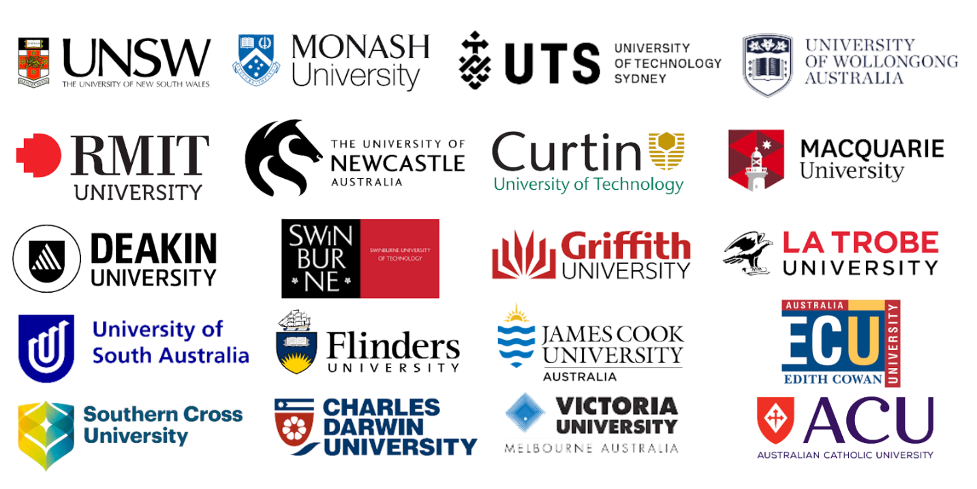Study in Australia

Why Study in Australia?
Australia, without a doubt, is a top study abroad destination. Top-ranked universities, research facilities, and excellent career and future opportunities attract international students to study in Australia. The degrees achieved in the country are recognized all over the world.
Australia is one of the most preferred destinations for education among Indian students, not only because of its world recognised qualifications but also due to the quality of education offered with research and the post masters opportunities available for students.
Seven Australian universities feature among the world’s best in the latest QS World University Rankings. While seven universities are in the global top 100, another 10 are in the top 300. Five Australian institutions claimed a place among the top 25 places in the Times Higher Education ranking of the international universities. Emphasis on Scientific research by Australian Universities is one major factor which made most of the universities get into the top QS World rankings, which is one of the major factors which attracts a large number of international students.
Along with that students can work while studying which can help them earn their living costs. With spectacular sights and weather Melbourne and Sydney are ranked among the top 10 preferred destinations for students in the world.
Australia has an integrated education system, which seamlessly connects primary, secondary, tertiary (or as we say higher) education and vocational opportunities. This system enables students to move from one stage to the other without feeling at sea. The cornerstone of the education system is the “Australian Qualification Framework (AQF)”, which is the national policy for regulated qualifications in Australian education and training. Given AQF’s reputation, Australian degrees are recognized across the world. With fewer universities in the country, Australian Government has complete control over the universities.
Besides, the Education Services for Overseas Students (ESOS) framework protects the rights of international students studying in Australia, including your right to receive, before enrolling, current and accurate information about the courses, fees, modes of study, and other information from your institution and your institution’s agent.
Topmost reasons to Study in Canada
- 7 of World’s Top 100 Universities
- Choose from over 22,000 Courses across 1,100 Institutions
- 7 of the Best Student Cities in the World (QS Best Student Cities 2023)
- More than A$300 Million Invested in Scholarships for International Students
- Australian Universities have Produced 15 Nobel Laureates
- More than Half a Million International Students from 192 Countries
- Post Study Work Visa up to 6 years*
- Good Permanent Residency Prospects
English Test Required
To be admitted into Australian Universities student needs to have one of the following examinations along with academic credentials
- IELTS (The International English Language Testing System)
- TOEFL (Test of English as Foreign Language)
- PTE (The Pearson Test of English)
- CAE (The Cambridge English)
- OET (Occupational English Test)
Major Intakes
Australian universities majorly focus on two intakes
- February Intake (Also referred as Semester 1)
- July Intake (Semester 2)
Few Intakes offer limited programs for September & November Intakes. July being the major intake in Australia which most of the Indian students prefer. Both July and February intakes are equally good for most of the programs.
Process Flow
- Course and University Selection
- Check University Requirements
- Apply Online – Complete Application Process
- Submit Financial Summary to University
- Pay 1st Semester Tuition Fee
- Receive Electronic Confirmation of Enrolment (eCOE)
- Apply for VISA
Application Checklist
- Application Form
- TOEFL/IELTS/PTE Exam Score photocopies
- Academic Certificates (Scanned Copies)
- SSC, Inter, Bachelor’s certificate
- Photocopies of first and last pages of passport
- Experience certificates (If Applicable)
Visa checklist
- Electronic Confirmation of Enrolment (eCOE)
- Proof of Funds – Return Air Fare, Course Fee, Living Costs
- Demonstrate English Language Proficiency
- Meet health and character requirements.
- Provide evidence of Overseas Student Health Cover
The length of your stay will depend on the course you intend to study. Additional time may be granted at the end of the course depending on its length. However, the length of stay for a postgraduate research student is usually 6 months longer than the usual relevant period set out for a course.
Popular Courses
Among the most sought after courses in Australia are
- Engineering: Mining and construction combined has contributed to around 24% of Industry output for 2019 in Australia. This shows the demand for core engineering graduates in Australia. Computer and IT: In 2019, 23 Australian institutions were ranked in the world’s top 500 universities for computer science
- Business: Every organisation in the world looks for business graduates for the development of Organisation and MBA from Australian Universities have got great return on Investment. Programs like Business Analytics are in great demand these days. Companies are looking for analysts who can compile and analyse the available data and help organisations make decisions.
- Pharmacy and Health Science: Eight of Australia’s nineteen universities have featured in the world’s top 100 medical school ranking. 13% of the Australia Industrial share Output is from Health and Education.
- Environment Studies: Australia contributes 2.4% of the global stock of knowledge with regard to environmental science and 4% of all environmental science publications in the world
- Accounting: It is the fastest-growing profession in Australia
Cost of living
While the cost of living is comparably higher in Australian cities than in other cities across the world, Students are allowed to work in Australia for 20 hours per week during semester and full time during the breaks. This will help students earn enough money to cover their living expenses and still leave plenty of time to cover their studies. Even with a part time job, the student can have ample time for their academics.
However, in order to maintain a basic standard living, a student would need at least $600 – $800 per month. This again varies with the location where the student is willing to pursue his education and student lifestyle.
Australia also has a system called Fair Work Ombudsman, which is an independent statutory office, that will not only help you look for work but also ensure that you know about workplace rights and that you are not exploited. Effective from July 2019, The Fair work commission has announced a new national minimum wage as $19.49 per hour.
Tuition cost
Tuition fees for international students range from $20,000 to $26,000. Few top ranked Universities even have higher Tuition fees. The fee will also depend on the course opted, ranking of the university; for instance, a university, which features among the top 10 universities in the world and ranked by a recognized and prestigious authority will certainly have a steeper tuition fee. International students are offered few scholarships which are selective.
Post Study Work Rights
New visa rules starting from 16th November 2019 allows international students to avail post study work visa up to 4 years. This confers right to international students to live up to 4 years in Australia after completion of bachelors or masters in regional universities. Few major cities like Canberra, Adelaide, Gold Coast, Macquarie etc offer additional one-year PSWV (Total 3 Years). New Post Study Work Visa (PSWV) Norms
- 2 Years PSWV, If Student studies in Melbourne, Sydney, Brisbane
- 3 Years PSWV, If Student studies in Perth, Adelaide, Gold Coast, Wollongong, Hobart, Geelong, Sunshine Coast
- 4 Years PSWV, if Student studies in Darwin, Rockhampton, Goldstone, Toowoomba, Bendigo, Cairns
With this new 500 Subclass Student Visa post study work visa, you will have more time to live in the country which gives you more time to plan your career in a better way. There are three factors to keep in mind when you finish your education in Australia
- Given the reputation of Australian universities abroad, their degrees and certificates are recognized across the world. So, once you are equipped with the necessary degrees and skills you could apply for work anywhere in the world.
- If you wish to return to your home country to work, besides your degree being recognized, companies will take into account that you have grit, experience, mettle and are open-minded. To move out of one’ comfort zone, acclimatize in another setup and then excel at the work at hand takes effort and most companies recognize that.
If you wish to stay back in Australia then there are two options, either you pick a visa from the website of ministry of home affairs, depending on the time you want to spend and the kind of work you want to do (Australia has a large market for skilled labour) or apply for permanent residency.
FAQs
Why Study in Australia?
Australia has some of the very best attributes desired by international students in a study-abroad destination. With high ranked universities, availability of part-time jobs, and 6 years* Post Study Work Visa, students find Australia one of the best places to obtain their higher education.
Which courses can we apply in Australian Institutions?
You can opt for a course of your choice, be it from Science, Management, Tourism, Hospitality, Commerce, Humanities, Engineering, Law or Health Sciences. Whatever you choose you will get the best as Australian institutions rank among the world’s best particularly in the fields of Engineering and Technology, Medicine, Nursing, Environmental Science, Accounting and Finance.
What are the different study levels that we can apply for to pursue higher education in Australia?
You can apply for undergraduate, postgraduate & research courses. You can also apply for the package courses which include diploma leading to an undergraduate degree and graduate diplomas leading to post graduate degrees.
What are the most popular courses in Australia?
Agricultural Sciences, Information Technology, Hospitality Management, Engineering, Science.
What are the entry requirements for Australia?
You will need to meet a range of entry requirements both for your institution application and your visa application for Australia. • Academic requirements • English language requirements • Evidence of funds to support your study • Overseas student health cover

